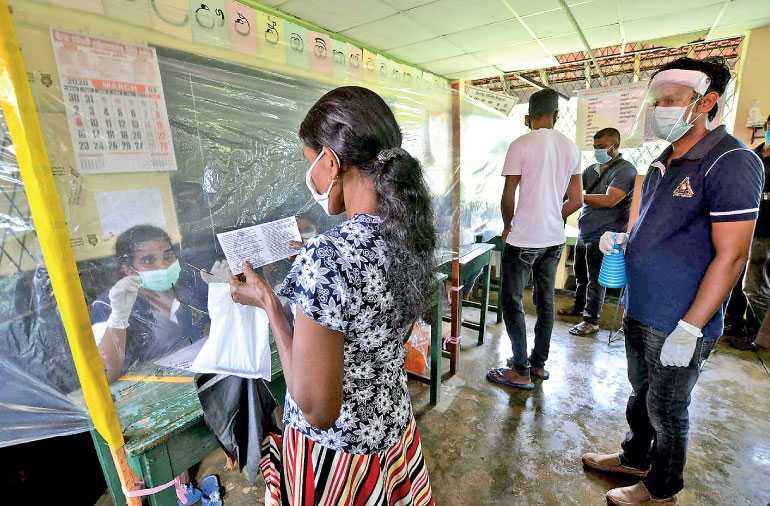Saturday Feb 14, 2026
Saturday Feb 14, 2026
Wednesday, 5 August 2020 00:14 - - {{hitsCtrl.values.hits}}

To all voters in this election, the only message is that no prosperity and splendour could be achieved without equity and justice, no equity and justice without good governance, and no good governance under a Sinhala-Buddhist mytho-historic supremacist ideology – Pic by Shehan Gunasekara
There is no ruler without an army;
And there is no army without revenue;
And there are no revenues without cultivation;
And there is no cultivation without equity and good governance.
 These lines are a shorthand rendering from a medieval Arabic text on the concept of Circle of Equity or Circle of Justice, written by the Ottoman writer, Kinalizade, which encapsulates the critical interrelationship between the ruler and ruled via security, revenue, prosperity, equity and good governance (Paul M. Cobb, The Race for Paradise: An Islamic History of the Crusade, United Kingdom: Oxford University Press, 2014, p. 23. For two other versions of this and for the history of the concept, see Linda T. Darlington, A History of Social Justice and Political Power in The Middle East, London & New York: Routledge, 2013, pp. 2&3). The concept of the circle itself, according to Darlington predates the Ottoman era and goes right back to 3rd century BCE to the time of Sumerians.
These lines are a shorthand rendering from a medieval Arabic text on the concept of Circle of Equity or Circle of Justice, written by the Ottoman writer, Kinalizade, which encapsulates the critical interrelationship between the ruler and ruled via security, revenue, prosperity, equity and good governance (Paul M. Cobb, The Race for Paradise: An Islamic History of the Crusade, United Kingdom: Oxford University Press, 2014, p. 23. For two other versions of this and for the history of the concept, see Linda T. Darlington, A History of Social Justice and Political Power in The Middle East, London & New York: Routledge, 2013, pp. 2&3). The concept of the circle itself, according to Darlington predates the Ottoman era and goes right back to 3rd century BCE to the time of Sumerians.
The relevance of the circle of justice and equity is particularly relevant to Sri Lanka in the context of the much touted aspiration of President Gotabaya Rajapaksa, who wants to achieve his goal of ‘prosperity and splendour’ by creating a ‘disciplined and virtuous’ society. Already, one could witness a trend towards militarisation of civilian administration, restrictions on democratic freedom, interference with judiciary, and assaults on cultural and economic domains of selected community groups, all of which provide some indication about his views on discipline and virtuosity.
Under his rule, principles of equity and justice have taken a majoritarian twist to be confined only to the Sinhala-Buddhist segment of the society on whose backing GR won his presidency to start with. While his administration through arbitrarily chosen taskforces headed by military men underlines the President’s idea of discipline, his exceptional tolerance of intolerance against minorities by maverick members of a priestly hierarchy, who are the backbone of GR’s constituency explains his vision of virtuosity. Militarisation and intolerance in the name of discipline and virtuosity are obvious identities of bad governance and inequity.
There is a high probability that this trend would continue after the election this week. The victory of GR-backed Sri Lanka Podujana Peramuna (SLPP) is a foregone conclusion. The only problem is the size of that victory. If SLPP wins with an absolute majority the pre-election trend will gain momentum, authoritarianism will be entrenched, and segments of the society, particularly the minorities, would be forced to put up or shut up. Discontentment with the regime would be pushed underground, and when, where and in what manner would it manifest in the open is unpredictable. Once again, amidst mounting economic adversity the regime would be forced to divert its meagre resources to monitor the President’s ‘disciplined and virtuous society’. As Santayana said, “those who cannot remember the past are condemned to repeat it”.
This is the reason why the election on 5 August is going to determine the destiny of Sri Lanka and the future of its pluralist democracy. In no other election before, the vote of every citizen of the country was so crucial as it is going to be in this one. Abstention is no option. Whichever the party that is going to win the contest and form government, the strength of the opposition in the legislature would be crucially important to check the excesses of rulers. It is no secret that GR-backed, MR-led and BR-designed SLPP wants to turn Sri Lanka into a replica of Xi’s China or Modi’s India, in political terms. This is a clear and immediate danger to the country’s minorities. Hence, this election poses a life and death struggle to ethnic and religious minorities.
Within the two ethnic minorities, Muslims have a historical tendency to go along with the winning side and support whoever that captures power. There are certain religious and economic factors that have contributed to this tendency, and which I have analysed in a previous piece (CT, 28 July 2020). This line of thinking has outlived its purpose. It would be suicidal if Muslim community leaders continue with that attitude because, the forces that are working behind GR-MR-BR trio are bitterly anti-Muslim and they do not consider this community as part of the nation. This is one election in which the Muslim community must strengthen the hands of the opposition. A patriotic, democratic minded and humanist Sinhala or Tamil candidate is preferable to be voted than a selfish, religious-centric and communal minded Muslim politician. Muslims should vote not in the interest of their short-term benefits but in the interests of their progenies who should live as citizens with equal rights and obligations.
To all voters in this election, the only message is that no prosperity and splendour could be achieved without equity and justice, no equity and justice without good governance, and no good governance under a Sinhala-Buddhist mytho-historic supremacist ideology.
(The writer is attached to the School of Business and Governance, Murdoch University, Western Australia.)